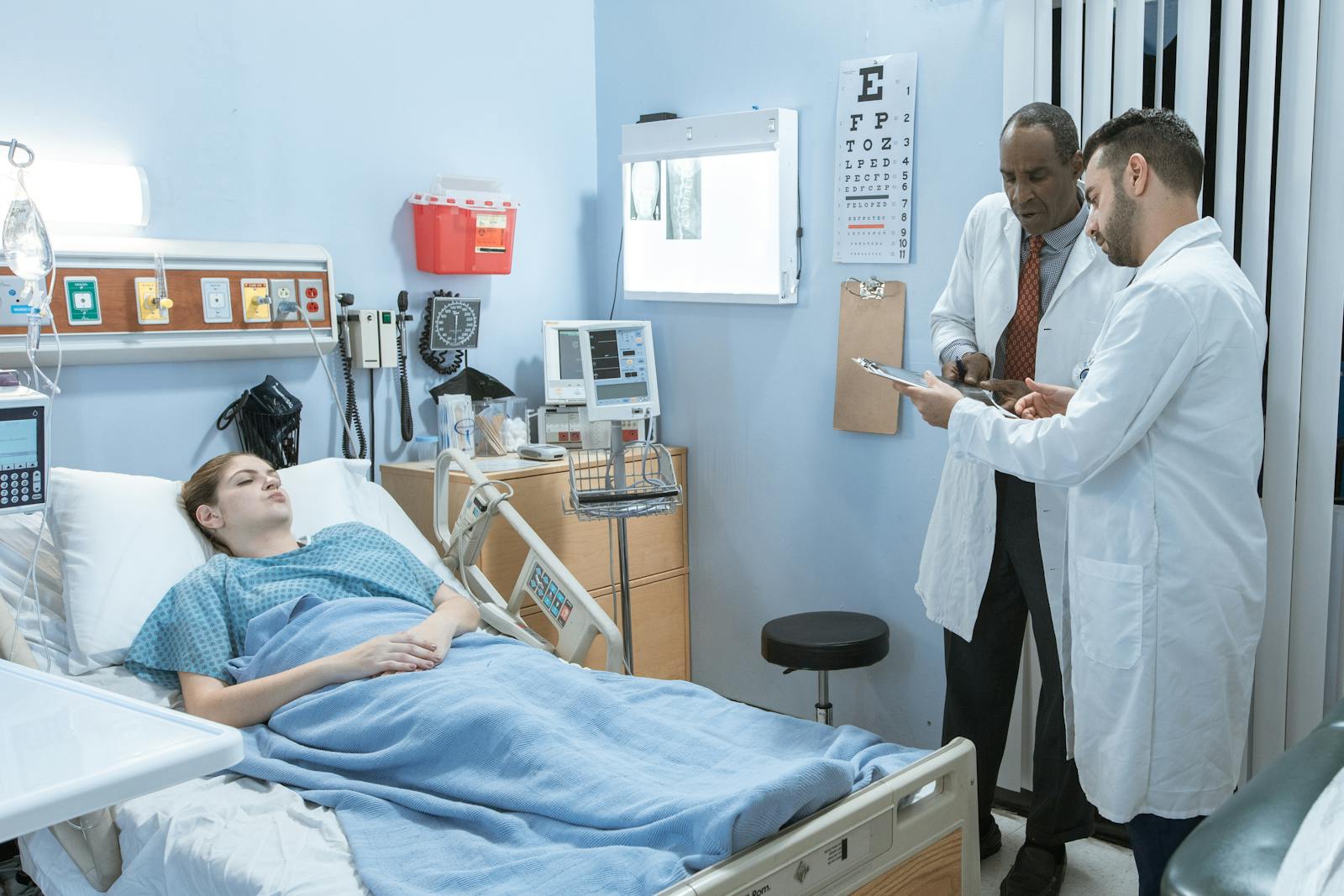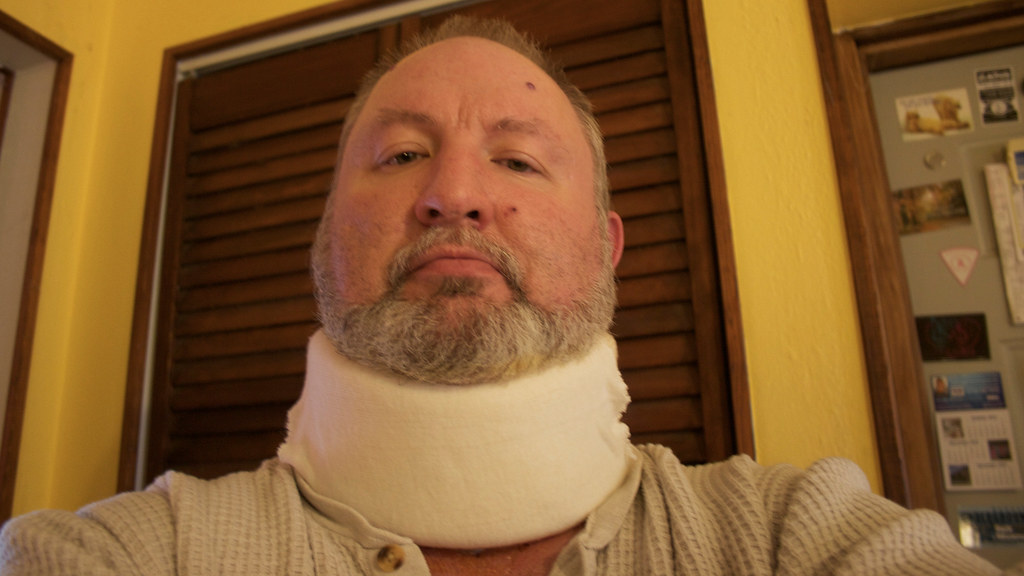Exploring the post-operative period following neck surgery can be a intricate process, filled with several critical considerations. It is not simply about physical recovery but also involves a strategic approach towards nutrition, mental well-being, and the gradual resumption of daily activities. Delving into this detailed roadmap, we find ourselves faced with key questions: How best can we manage pain and discomfort? What role does diet play in healing? How can we regain mobility and strength in a safe and effective manner? Join us as we investigate these aspects, and more, to facilitate a thorough understanding of the post-surgery journey.
Understanding Neck Surgery
Understanding the intricacies of one’s neck surgery is an essential step towards a successful recovery. Different types of neck surgeries target varying conditions, from herniated discs to spinal deformities. Being informed about the specific surgery type can facilitate a realistic outlook on recovery timeframes and potential complications.
Surgery types can range from minimally invasive procedures, such as a cervical discectomy, to more complex operations like a spinal fusion. A cervical discectomy, for instance, involves the removal of a herniated disc to alleviate nerve root pressure, while a spinal fusion stabilizes the spine by joining two or more vertebrae together. Understanding the specifics can help patients better manage their expectations and participate actively in their recovery.
Surgeon selection is another important aspect to consider. The surgeon’s experience, reputation, and specialization can greatly influence the success of the operation. It is crucial to ask questions about the surgeon’s experience with the specific type of surgery and success rates. Additionally, patient reviews and testimonials can provide valuable insights. This information can help patients make an informed decision and foster a more comforting, trusting relationship with their surgeon.
Immediate Post-Surgery Care
Once the surgery is completed, immediate post-operative care plays a pivotal role in determining the pace and quality of your recovery. This initial phase encompasses several key elements that work in synergy to enhance your healing process.
- Post-Surgery Hygiene: The surgical site should be kept clean and dry to prevent infection. Always follow your doctor’s instructions regarding wound care and bathing. Avoid scratching or disturbing the surgical area.
- Support System Importance: Emotional and physical support from family and friends can greatly aid in your recovery. This includes help with daily tasks and emotional encouragement to overcome the challenges post-surgery.
- Nutrition: A balanced diet rich in protein, vitamins, and minerals is essential for the body’s repair process. Stay hydrated and aim for a gradual increase in physical activity as per your doctor’s advice.
- Rest: Adequate rest is crucial to promote healing and recovery. Sleep with your head elevated to reduce swelling. Avoid strenuous activities that could put strain on your neck.
Pain Management Techniques
Managing post-operative discomfort is vital to effective recovery after neck surgery. It’s imperative to explore both pharmaceutical and non-pharmaceutical techniques for pain relief. Understanding the nature of post-operative pain can also contribute to more effective pain management strategies.
Understanding Post-Operative Pain
Getting through the aftermath of neck surgery, effective pain management plays a pivotal role in your recovery, primarily due to the potential for post-operative discomfort. This discomfort is often influenced by factors such as Pain Perception Variance and Post Operative Mental Health.
Understanding post-operative pain involves:
- Pain Perception Variance: Everyone experiences pain differently. Your perception of pain can be influenced by your physical condition, emotional state, and past experiences with pain.
- Post Operative Mental Health: Mental health plays a significant role in pain management. Depression or anxiety can exacerbate the perception of pain, making it important to manage these conditions.
- Pain Duration: Post-operative pain can be acute (short-term) or chronic (long-term). Understanding the difference can help plan your recovery.
- Pain Location: Identifying the exact point of pain can facilitate targeted treatment and improve recovery.
Medication for Pain Relief
In the pursuit of effective post-operative recovery, addressing the role of medication for pain relief becomes an integral part of the process. Analgesics, including opioids, are commonly prescribed after neck surgery. However, their use should be judicious given the opioid dependency risks. It is crucial to contemplate a patient’s history and potential for developing addiction.
A carefully managed regimen can minimize these risks. Incorporating alternative herbal remedies, such as turmeric and white willow bark, can complement traditional medications. These natural options have been acknowledged for their anti-inflammatory and analgesic properties. Yet, it’s important to remember: these are not a complete replacement for prescribed medication. Always consult with healthcare professionals before making any changes to your pain management plan.
Non-Pharmaceutical Pain Techniques
Beyond pharmaceutical interventions, a variety of non-pharmaceutical pain management techniques offer additional avenues for enhancing comfort and promoting healing after neck surgery.
- Acupuncture: One of the key acupuncture benefits is the potential to reduce pain and inflammation. This ancient Chinese therapy can improve circulation and stimulate the body’s natural painkillers.
- Guided Imagery: This technique involves envisioning pleasant scenarios or places to distract from pain. It can promote relaxation and reduce stress, aiding recovery.
- Physical Therapy: Gentle exercises and stretches under a therapist’s guidance can strengthen neck muscles, enhance flexibility, and alleviate discomfort.
- Heat/Cold Therapy: Applying heat or cold to the affected area can provide temporary relief from pain and swelling, assisting in the healing process.
These non-pharmaceutical techniques can be effective supplements to traditional pain management strategies.
Essential Neck Exercises
Your surgeon’s prescribed regimen of neck exercises is an essential component in ensuring ideal recovery post-neck surgery. These exercises are designed to aid in the restoration of mobility and strength in the neck region. It is important to remember that during the initial stages of recovery, neck brace usage is important. This assists in maintaining a stable position, reducing stress on the neck and helping to prevent further injury.
In addition to physical exercises, emotional healing techniques play a crucial role in recovery. Implementing techniques such as meditation, deep breathing, and visualization can greatly aid in managing post-surgical stress and anxiety. It’s important to remember that mental well-being directly influences physical healing. Be patient with the process and allow the body to heal at its own pace.
It’s also imperative to follow your surgeon’s instructions diligently. Overexertion can be detrimental, potentially leading to setbacks in recovery. If any exercise causes pain or discomfort, it is essential to stop immediately and report the situation to your healthcare provider. Through consistent practice of prescribed neck exercises and emotional healing techniques, a successful recovery can be achieved.
Dietary Adjustments Post-Surgery
Following neck surgery, the body’s nutritional needs alter as it enters a healing phase. The inclusion of certain foods can enhance recovery, while others ought to be sidestepped due to potential complications. We will now assess these dietary adjustments necessary post-surgery for best patient recovery.
Post-Surgery Nutritional Requirements
In the aftermath of neck surgery, careful attention to nutritional intake plays a pivotal role in fostering speedy recovery and ideal healing. Particularly, supplement usage and the importance of hydration are two key factors to contemplate.
Here are four points to guide your post-surgery nutritional requirements:
- Supplement Usage: Certain supplements can aid in tissue repair and boost immunity. Consult your doctor for the most appropriate choices tailored to your individual needs.
- Hydration Importance: Adequate water intake is essential for ideal body functioning and can expedite the healing process.
- Caloric Intake: Make sure your diet meets your body’s increased energy needs during recovery.
- Balanced Diet: Incorporate a variety of nutrients to support overall health. Be mindful of the next subtopic, ‘Healing Foods to Include’.
Healing Foods to Include
After undergoing neck surgery, incorporating specific healing foods into your diet can greatly enhance the recovery process and promote effective healing. Probiotic benefits have been highlighted in numerous studies for boosting the immune system and aiding in digestion, which is vital during the recovery phase. Probiotic-rich foods include yogurt, sauerkraut, and kefir.
Antioxidants are equally important for their ability to reduce inflammation and fight off harmful free radicals. Foods high in antioxidants such as blueberries, spinach, and nuts should be included.
Additionally, lean proteins like fish and chicken can aid in tissue repair and growth. Hydration is also important, so make sure you drink plenty of fluids. Incorporating these dietary adjustments post-surgery can greatly influence your healing process.
Foods to Avoid Post-Surgery
While it is essential to incorporate certain healing foods into your diet following neck surgery, it’s equally important to exercise caution and avoid specific foods that may hinder the recovery process.
Specifically, patients should be mindful of the following:
- Alcohol Consumption: Alcohol can interfere with medications and slow healing. It’s best to avoid it until your doctor gives the all-clear.
- Caffeine: Caffeine can dehydrate the body and exacerbate pain, making recovery more challenging.
- Processed Foods: High in sodium and low in nutrients, these foods can impede healing.
- Smoking Effects: Nicotine from smoking can delay healing and increase the risk of complications. Avoid smoking and foods containing nicotine.
Importance of Adequate Rest
Ensuring sufficient rest and sleep post neck surgery is crucial for a smooth and successful recovery. This period of recuperation is not only about physical healing but also about sleep quality and mental relaxation. During this time, the body works tirelessly to repair damaged tissues and strengthen the neck area. However, without enough rest, this crucial process can be disrupted leading to complications.
Good sleep quality is essential, as it allows the body to engage in deep restorative stages of sleep. These stages are responsible for tissue growth, repair, and the release of hormones that aid in healing. Poor sleep quality can impede these processes, prolong recovery time, and exacerbate pain and discomfort.
Mental relaxation plays a significant role as well. The stress and anxiety that often follows surgery can negatively impact the body’s healing capabilities. As such, patients should engage in activities that promote mental relaxation such as reading, meditation, or listening to calming music.
Tips for Safe Mobility
In addition to rest, managing post-operative mobility safely is paramount to a successful recovery from neck surgery. A well-thought-out plan for movement and posture correction can greatly reduce discomfort and accelerate healing.
- Mobility aids usage: Post-surgery, your neck and surrounding muscles may be weak. Using mobility aids like walkers or canes can provide the necessary support and balance, reducing the risk of falls and further injury.
- Posture correction: Maintaining good posture is essential. Slouching or straining can exacerbate pain and delay healing. Work with a physiotherapist to learn and practice correct sitting, standing, and walking postures.
- Pacing activities: Overexertion can lead to unnecessary strain. Balance activity with rest periods and gradually increase the level and duration of activity as your strength improves.
- Seek professional guidance: Always consult with your healthcare provider or physical therapist for personalized advice. They can provide guidance on safe movement techniques and the correct use of mobility aids.
Wound Care and Hygiene
Proper wound care and hygiene are crucial components of the recovery process following neck surgery. It not only accelerates healing but also aids in infection prevention and scar minimization.
After surgery, the wound site must be kept clean and dry to deter bacterial growth. Gentle cleansing with a mild soap and warm water, followed by patting dry, is usually sufficient. Avoid scrubbing or applying harsh products, which may irritate the skin and disrupt healing.
Infection prevention is essential. Monitor for signs of infection such as increased pain, redness, swelling, or discharge from the wound site. It’s also important to take prescribed antibiotics as directed by your healthcare provider.
Scar minimization can be achieved by applying a silicone-based cream or gel once the wound has completely healed. This can help reduce scar thickness and discoloration. Additionally, protecting the scar from sun exposure for at least a year can prevent darkening.

Long-Term Rehabilitation Strategies
Implementing a thorough, extensive rehabilitation strategy is a pivotal step in achieving ideal recovery following neck surgery. The process can be multifaceted, addressing both physical and psychological needs. The importance of a strong support system and the mental health effects of such a significant health event cannot be understated.
To better understand the all-encompassing nature of long-term rehabilitation strategies, consider the following four factors:
- Physical Therapy: This encompasses regular, structured exercises designed to restore strength, flexibility, and range of motion in the neck and surrounding areas.
- Support System: Having a reliable network of family, friends, and medical professionals is essential. This group can provide encouragement, assistance, and necessary feedback throughout the recovery journey.
- Mental Health: The psychological impact of neck surgery can be substantial. Patients may experience anxiety, depression, or other mental health conditions. Regular consultations with a psychologist or counselor can be beneficial.
- Lifestyle Modifications: This could involve changes in diet, exercise, sleep patterns, and stress management techniques to support overall health and recovery.
This holistic approach to rehabilitation can markedly improve the patient’s quality of life and hasten their return to normalcy.
Dealing With Emotional Aftermath
While physical recovery is an essential part of the post-surgery process, managing the emotional aftermath of neck surgery is equally important to ensure thorough healing. The emotional repercussions are often underestimated, yet they have a substantial impact on the surgery outcomes. Emotional resilience, the ability to adapt well in the face of adversity or stress, plays an integral role in this phase.
Many patients may experience feelings of anxiety, depression, or frustration due to the temporary loss of independence and the slow pace of physical recovery. Therefore, fostering emotional resilience becomes a necessary aspect of post-operative care. It aids in accepting the new reality, handling discomfort, and maintaining a positive mental state, thereby promoting better healing.
Therapy benefits in this context are manifold. Cognitive Behavioral Therapy (CBT), for example, is proven to be effective in managing post-surgery distress. It assists individuals in reshaping their thought patterns, thereby alleviating emotional turmoil. Additionally, group therapy can provide a supportive environment, offering solace in shared experiences. Therapy, coupled with emotional resilience, can have a significant impact on the emotional recovery process, leading to a more holistic healing after neck surgery.
Returning to Daily Activities
In conjunction with managing the emotional aftermath, gradually reintegrating into daily activities forms another important step in the holistic recovery process following neck surgery. This process, however, should be carried out with care to avoid undue strain on the neck and to guarantee a smooth shift back to normalcy.
To assist in this shift, consider the following steps:
- Physical Activity: Start with light activities like walking. Gradually increase the intensity as your body allows, but avoid any activity that causes pain or discomfort.
- Driving Post Surgery: It is vital to consult your doctor before you start driving, as the ability to turn your head is necessary for safe driving. Driving prematurely could lead to complications or accidents.
- Work: Depending on the nature of your job, you may need to discuss modifications with your employer. Some tasks may need to be adjusted or delegated to ensure your recovery is not compromised.
- Social Interactions: Start with short visits with close family or friends. As you gain more energy and comfort, gradually return to larger social settings.
Signs of Possible Complications
Consistently monitoring your physical condition post neck surgery is essential to promptly detect and address any potential complications. It’s imperative to be vigilant about any changes in your body, especially those that could signal a problem. Infection indicators, for instance, should never be overlooked. These may include fever, foul-smelling drainage from the surgical site, or an unusual increase in pain.
Another important sign is unexpected swelling. While some swelling is normal after surgery, a sudden or severe increase may suggest a problem, such as a hematoma or seroma. It could also indicate an infection, especially if accompanied by redness, warmth, or tenderness. In such instances, seeking immediate medical attention is crucial to prevent more serious complications.
Other signs of possible complications include difficulty swallowing or breathing, persistent numbness or weakness, or changes in voice. If you experience any of these symptoms, it’s important to contact your healthcare provider promptly.
Frequently Asked Questions
Can I Continue Taking My Regular Medications After Neck Surgery?
Continuing regular medications post-surgery may depend on potential medication interactions. It is crucial to consult your surgeon or healthcare provider to confirm they align with your post-surgery diet and recovery plan.
How Will Neck Surgery Affect My Ability to Drive?
Neck surgery can temporarily impact your driving ability. Post surgery exercises and a personalized recovery timeline can help restore mobility. However, it’s essential to get a doctor’s clearance before getting back behind the wheel.
Will I Need Any Special Equipment at Home After Surgery?
Post-surgery, you may require special equipment for support and comfort. Additionally, focus on post-surgery nutrition to speed recovery and engage in rehabilitation exercises as advised by your physician to regain strength and mobility effectively.
Is It Normal to Experience Changes in Voice or Swallowing After Neck Surgery?
Yes, it’s not uncommon to encounter changes in voice or swallowing post-surgery. Incorporating a soft food diet and rehabilitation exercises can help manage these changes and aid in your recovery process. Consult with your doctor for personalized advice.
Can I Travel by Plane or Engage in Other High-Altitude Activities Post-Surgery?
Post-surgery exercises and adhering to your recovery timeline are vital. Air travel or high-altitude activities may not be advisable immediately post-operation. Consult your surgeon for a specific timeline and guidelines for such activities.


